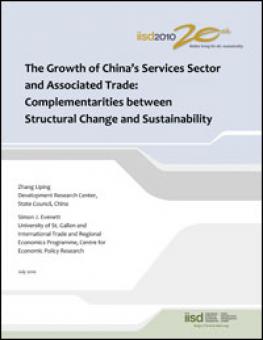
The Growth of China's Services Sector and Associated Trade: Complementarities between Structural Change and Sustainability
This paper describes the possible contributions of China's service sector to the country's sustainable trade strategy.
Chinese and international evidence points to the importance of seeing national service sector development in the context of forces that drive the structural transformation of economies more generally, both in terms of types of economic activity and spatial allocation. Rather than identifying sectoral cases where win-win or win-win-win outcomes are possible, our approach recognizes the diversity of activities within the service sector and the relationship between many of the commercial service sector activities and the growth and productivity of the manufacturing sector.
You might also be interested in
Heatwaves to hit China once every 5 years as global extreme weather events multiply, study finds
Record-breaking heatwaves that have scorched North America, Europe and China are set to worsen in future unless the world stops burning fossil fuels, according to a study by the World Weather Attribution (WWA) academic initiative.
Can China Contribute to Climate Action in Latin America?
Sisi Tang discusses three climate action initiatives between China and Latin America: a crediting mechanism for clean energy, debt-for-climate swaps, and a greener free trade agreement.
Transition from fossil fuels to renewable energy can pose fiscal challenges for India: study
The global transition away from fossil fuels to renewable energy sources could trigger financial challenges for India and major developing countries such as Russia, Brazil and China because of their high dependence on revenues from fossil fuel, according to a study by the International Institute for Sustainable Development (IISD).
IISD Report: Shifting Away from Fossil Fuels Could Lower BRIICS Nations' Revenues
A new report by the International Institute for Sustainable Development (IISD), titled Boom and Bust: The Fiscal Implications of Fossil Fuel Phase-Out in Six Large Emerging Economies, looks at the potential financial ramifications of phasing out fossil fuels in six emerging economies — Brazil, Russia, India, Indonesia, China, and South Africa (BRIICS). They must begin adjusting their fiscal policies to account for declining fossil fuel use or risk a $278 billion revenue gap by 2030.